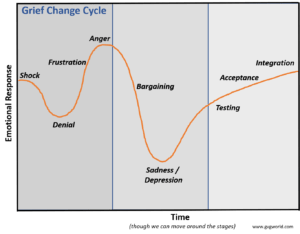
For many of us, the pandemic created one of the biggest shifts in our work and personal lives. It was a massive pivot! And we learned A LOT about how to handle change in the process.
With families forced back together in small spaces and individuals living alone feeling more isolated, emotions of uncertainty and even fear began to well up for many of us. These times were unprecedented, the largest earth-changing event in 100 years by some estimates. Realizing that we were going through a global GRIEF cycle was a big part of coping, adapting and strengthening during this time.
Many of us who grew up in a “suck it up, buttercup” environment are pushing ourselves just to move forward and “get on with it.” However, recognizing our emotions and the cycle we are in is an essential part of this process, during the pandemic and anytime we have this type of event in our lives.
The Learnings
When things happen beyond our control, we may deal with a Grief Cycle that is also propelling us on a steep and massive Change Curve. It’s about uncertainty for how the future will unfold and what it will look like for us. The pandemic and other global events can shake the foundations in every part of our lives. From physical health to family dynamics to economics to personal and team values, no part of our existence is untouched by these events. It is unprecedented for so many aspects of our lives to be “unhinged” at one time for so many of us. The iterations and layering that is happening as we move through a grief change cycle for different aspects of our life (health, family, work, global impact) may be compounding the emotional challenges.
The Grief Cycle and the Cycle of Change are mostly the same. It requires us to let go of the past to move into the future. Here are the stages for your consideration. Remember, they are not linear. We can jump between the stages at different times AND for different parts of our life.

-
- Shock / Denial – I must be dreaming! Surely I will wake up soon.
- Anger /Fear – how dare you take my role, activities, people away
- Bargaining – if we all pitch in we can get back to “normal”
- Sadness / Depression – when and where is this all going to end; my life is over
- Testing – maybe there is something in this we can salvage
- Acceptance – let’s find strategies to cope; settle into the “new norm”
- Integration – this is how we do it now; I can’t recall how we used to do it
Where are we individually and collectively in these phases during change? And recognizing we are in a cycle, what do we do with this information?
1. Develop Awareness and Observation
Step 1 is always awareness. Observing and then accepting our current emotional state and the emotional state of others helps to shift from feelings to curiosity. It is not productive to judge nor compare where others are on the grief change curve relative to us. When we can get curious and find a place of observation, we can shift to a more productive viewpoint.
2. Ride Out the Emotional Wave
When we have feelings that emerge as part of a grief change cycle, it is vital to allow these emotions to surface and release. Every time we suppress emotions and push them back down, it is only a temporary fix. They will eventually come back and be triggered again and again until we deal with them and release them.
One technique for release is riding the emotional wave. When emotions come up, stop, and feel them coming to the surface. Picture yourself on a surfboard or boogie board and let the waves of emotion swell up. Picture yourself ON TOP of the wave versus being tossed around INSIDE the wave, becoming overwhelmed. You are observing and balancing with the feelings, and staying present with it as a way of acknowledgment. When the wave of emotion eventually subsides, visualize landing on a beach and then get curious about what triggered it and why.
The power of this technique comes with allowing it to ride out, and then the non-judgmental curiosity can show us a more deep-seated need coming up, which can help us figure out any actions or next steps to move forward. Often when we get curious (without judgment!) about the source of the emotion, we uncover our fears, barriers, and programming in a way we can work with them. This understanding and observation helps to free us from some of our internal limitations that may be holding us back.
3. Highlight Areas of Control
During times of change, it becomes crucial to understand and determine what we can and cannot control. Understanding what we CAN do is more important than what feels lost. And sometimes, the ONLY thing we can control is OURSELVES. Our thinking and attitude are always available to us even when nothing else seems possible.
Viktor Frankl writes in his book “Man’s Search for Meaning” about what it takes to survive when control is completely stripped away. His experience during the Holocaust is a stark reminder that we never completely lose control of ourselves. It’s a choice. If you haven’t read his work, I highly recommend it for bringing perspective.
“When we are no longer able to change a situation – we are challenged to change ourselves.”
– Viktor E. Frankl
4. Create Plans and Strategies
Action helps us to feel in control as well. When we can break down and create routines and plans and then act on them, it allows us to feel we have some say in the outcome of what is happening around us. Get your family and team members involved in planning as well. How will work be set up? What does family night look like? What is our strategy and direction? How will we work together as a team? When we emerge into a next phase after a major change, we will have a “clean slate” to decide what activities and habits we want to establish or re-introduce. This is a fantastic time for making some new choices for our future lives.
The main point is our need to be compassionate with ourselves and others. Times of grief and change can be difficult. Recognize that emotions are running high and give yourself and others grace to process emotions and find strategies for the new norm moving forward.
Remember, we always have the choice to inspire hope, empower change, and drive connection!
